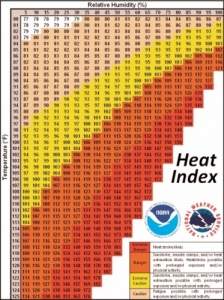Wayne County under advisory as heat index reaches 103 degrees
By News-Argus Staff
Published in News on July 12, 2017 3:17 PM
Wayne County is sweltering under mid-90s degree temperatures and a heat index that is expected to hit 103 by this afternoon.
Residents can expect more of the same Thursday.
At 10 a.m. today it was 82 degrees with a relative humidity of 97 percent making it feel more like 94 degrees.
The temperature had climbed to 90 and the heat index to 103 by 1:30 p.m.
There have been no heat-related emergency calls over the past week, said Mel Powers, Wayne County Emergency Services director.
But two people were treated for heat-related illness and released at the Wayne UNC Health Care emergency department, hospital officials said.
The heat and high humidity made it feel more like 102 to 105 degrees for a brief time this afternoon promoting the National Weather Service to issue a heat advisory for much of central North Carolina until 7 p.m.
A heat advisory means that a period of hot temperatures and high humidity will create a situation in which heat illnesses are possible.
The combination produced Wednesday morning's "real soupy and gross" feeling, said Brandon Vincent a meteorologist with the National Weather Service in Raleigh.
Despite the advisory, Wednesday was not to far off from the typical mid-July summer day, he said.
But the relatively mild summer thus far lends to making it seem worse than usual, Vincent said.
Expect a repeat Thursday with a high of 94 degrees with heat index values as high as 102.
The heat index is a measure of how hot it really feels when relative humidity is factored in with the actual air temperature.
There will be little relief at night with temperatures remaining in the mid 70s through Friday.
It will be at Friday or Saturday before thunderstorms bring any relief. Even then temperatures will remain in the upper 80s to low 90s.
People are advised to drink plenty of fluids, stay in an air-conditioned room, stay out of the sun and check up on relatives and neighbors.
Frequent hydration with small amounts of water has proven to be more effective than consuming large amounts less often, according to the National Weather Service.
Children and pets should never be left unattended in vehicles under any circumstances.
This is especially true during warm or hot weather when car interiors can reach lethal temperatures in a matter of minutes.
According to the National Weather Service if the outside temperature is 80 degrees, the inside temperature of a car can reach 114 degrees within 30 minutes and 123 degrees within an hour.

